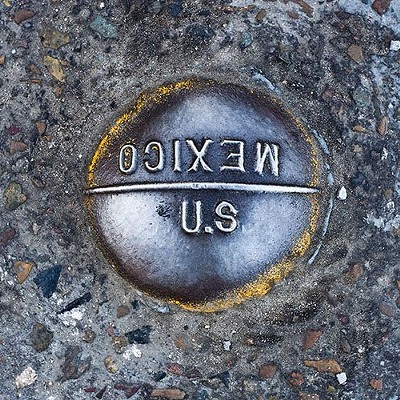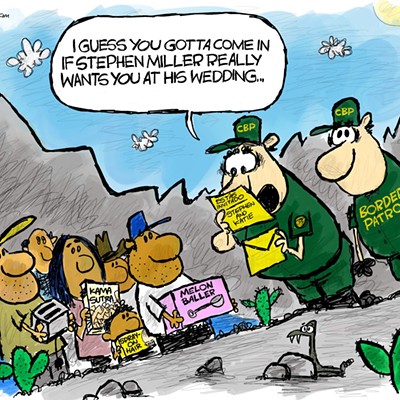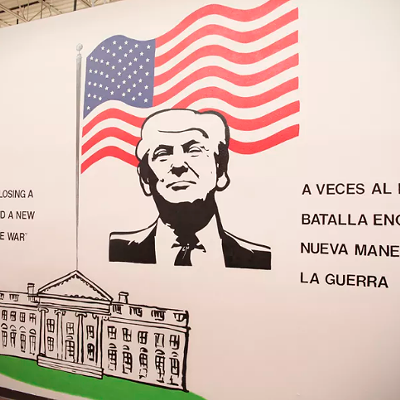But the fence didn't stop the traffic. It moved it elsewhere.
GRAVES: Yes. That's the purpose of the fence. But it did stop illegal vehicle activity.
Why do environmentalists hate the fence?
GRAVES: They assume the fence will stop special wildlife, like jaguars.
WIRTH: The wildlife will go around the end of the fence just like people do.
Last summer's Monument Fire, on the border at the Coronado Memorial, burned 30,500 acres, destroyed 62 homes and forced the evacuation of one-third of the community around Sierra Vista. Dan, the memorial is Department of Interior land, and when we talked earlier, you said you were 90 percent certain it was a smuggler fire.
WIRTH: It's probably closer to 95 percent. Think of the alternatives: There were no visitors because the park was closed. No hunters, no recreationists. The only people who might be out there were park rangers, and I checked with them. They weren't there. Border Patrol was there, but not right there. Who's left? Only one other entity visits the area regularly, and that's the smugglers. And we know the fire was human-caused.
GRAVES: There are no hiking trails there, no infrastructure there for the public to use for a legitimate purpose.
WIRTH: The fire started in that area where, as I said, there are 18 scout sites in 3 1/2 miles. Now, can we say absolutely it was a smuggler? No, because we didn't see him. But common sense tells you who it is.
GRAVES: There were six smuggling trails that were very active through there before the fire. I used to do fire investigations. I was a Homeland Security-trained wild-land fire investigator.
Your percentage of probability the Monument Fire was a smuggler fire?
GRAVES: I put it at 95 percent, too.
What about the Horseshoe 2 Fire in the Chiricahuas? It burned 223,000 acres and cost about $50 million to fight.
GRAVES: I would definitely put Horseshoe 2 at 100 percent. There was no evidence of anyone camping in the area, no place where a person could've gone to get to a vehicle to leave. Let me retract that: I'll say 99 percent. Maybe there was someone out there who ended up dying, and nobody cared. There always could be something. Still, if it was a local person who just got stupid, he would've been found. Whoever did it knew how to get away and never be seen again.
Border Patrol was chasing illegals up that trail right before it started. And it was started at a drug-smuggler camp at Burro Springs.
GRAVES: And there's a scout site not too far above that. On the Murphy Fire over here near Nogales, they actually found the person who started it. He admitted starting it and was rescued. But when they turned him over to Border Patrol, someone, some place, told him: If you say you started it, you'll be held accountable. Border Patrol agents know that isn't true. If you're in distress, fire is a legal means of getting rescued. Between the time they rescued him and got him to the hospital, someone told him he'd be held accountable if he admitted it. He thought he'd have to pay for it, so all of a sudden, he reneged and said he didn't do it.
I wrote about this last September. He was an illegal from Toluca, Mexico, and I'm told they deported him pretty quickly after his release from the hospital. Can we expect more fires this season?
GRAVES: Yes. The fuel load is very high. All we can tell the public is: We have the skills to help you protect your home by proper management of vegetation around it. Your rural fire department can protect your house. But we can help you protect the environment around it.
After last summer's fires, the U.S. Government Accountability Office reported that of 77 fires in Southern Arizona, 30 were suspected of being started by illegal crossers. That's 39 percent. How about stopping the illegals and smugglers at the border and eliminating that 39 percent?
WIRTH: Well, yes. But, again, we have a porous border, and you can have fences and vehicle barriers, but that doesn't mean you can stop everybody coming across. On the Monument Fire, the guys who started it most likely ran back into Mexico.
One of the theories of the Monument Fire is the smugglers wanted to burn out the two EITs—National Guard entry identification teams—that were on memorial land.
WIRTH: It's one theory of many. But the fire backfired on them, burning way too much.
GRAVES: A lot of times, people start a fire to get material through an area quickly, because it impacts the ability of Border Patrol to get there, shuts down flights because you put up flight restrictions, and completely destroys sensors in the area. The sensors can't pick anything up, and they come right through the hot smoke at night.
Fire is a tactic?
GRAVES: Yes, sometimes. In 2007, I remember fighting the San Antonio Fire right on the border at Lochiel, east of Nogales. Our scout plane was flying back for refueling at Fort Huachuca when the pilot saw drug-backpackers starting fires on a trail as they went north, to keep Border Patrol from catching them. I was the fire investigator on the San Antonio, and I was talking on the radio to base camp, and base camp was talking to the scout pilot.
I said, "Do you see the people starting the fire?" Yes. I said, "Is the scout plane leading a tanker?" Yes. I said, "Use the tanker to put the fire out." They said, "But the torch is in a person's hand." I said, "Put the fire out!" Permission denied. It's against policy to drop retardant on a human being. Put the cotton-picking fire out! They wouldn't do it. Yet the two Border Patrol agents chasing him were put in serious harm's way.
What happens if you drop retardant on him? He gets wet?
WIRTH: It would kill him. It's a tremendous amount of weight.
GRAVES: You're talking about dropping retardant on a person that can weigh 9 pounds per gallon, and that can seriously hurt.
We risked the lives of two agents for this shmuck?
GRAVES: I call it asymmetrical ethics. The smugglers will do anything to get drugs into the United States, to the people who want them. But we have an ethic that says, "We'll do this, but we cannot do that." We'll only go so far. The agents finally had to back off because of the fire. I got into trouble on that one.
Why?
GRAVES: Because I said to do something against policy. My response was: We have two agents who might get trapped by this fire. Sorry, policy. I joked that at least this guy would be painted when we found him, so we'd know who did it. And they didn't like that, either.
Were you told not to talk publicly about the fires last summer?
GRAVES: There were a couple of people down here going berserk because we were saying the fires were started by people coming across. We got direction from the Washington office telling us: Do not comment on how many fires you think are caused by illegal immigration. Human-caused, yes. Illegal immigrants and drug-smugglers, no.
Why not?
GRAVES: Too political. In some regions, Hispanics are considered the most-important voting block now.
WIRTH: Completely political. It happens with different subjects all the time. Plus, you have the State Department wanting to maintain good relations with Mexico.
Even though we have a pretty good idea who started these three huge fires last summer in Southern Arizona, they'll remain human-caused, under investigation, forever?
GRAVES: Forever.














